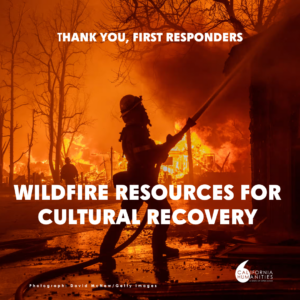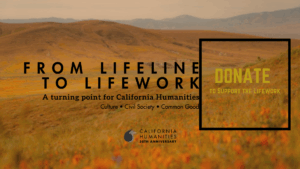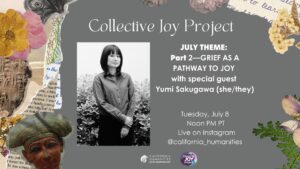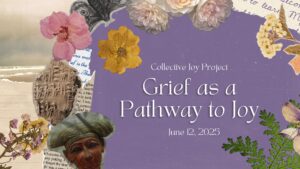David Washburn is a documentary filmmaker who has received support from California Humanities through the Communtiy Stories Grant project for his films, An American Mosque, and his newly funded project California Muslim Vets. These timely projects tackle the issues of religious intolerance, inter-faith collaboration and look to amplify Muslim voices in California.
Please tell us and our readers about American Mosque, your earlier project. What led you to do the project?
I think there are a couple reasons, one professional, and one more personal.
In 2004, I was working on a project in Yuba City (40 miles north of Sacramento) with founders of the Sikh community, when I heard about the story of the mysterious fire in 1994 that had destroyed the region’s mosque. Nothing had been written about it except in the local press; of course today the story would have been all over the internet within a few hours. I’m a storyteller and I’m always looking for stories. I thought this particular one about a group of Muslim farmers coming together to build a house of worship only to see it destroyed by a hate-crime / arson, would profoundly impact audiences. I saw the film’s main characters as representative of American Muslims’ faith in the Constitution, that freedom of religion extends to everyone. Rebuilding their mosque after the fire was testament to their faith in both Islam and America’s core values. I thought the story needed to be shared more widely, especially because of the anti-Muslim sentiment that surfaced after 9/11. I believe this even more today. It is personal stories like these that help us understand how intolerant rhetoric and violence impact real people in our communities.
The second part is more personal. As a youth, I attended B’nai Israel, a synagogue in Sacramento. In 1999 it was firebombed (two other synagogues were also attacked that night). The library was destroyed, along with a piano my family had donated. Following the attacks, there was a tremendous outpouring of interfaith solidarity and press coverage. Residents and merchants hung signs of support in their windows. The community really came together; it was a truly moving response to something abominable. As I dug into the Yuba City story, it was clear that the same kind of outpouring of support was not expressed publically. I felt an obligation to rectify that absence in some way and help amplify the Muslim voices in Yuba City, so their struggle could be recognized and lessons could be learned.
What resulted from that project?
The response has been really gratifying. Through community screenings, press coverage, and repeated PBS broadcasts, the story of the Yuba City mosque has now become part of the region’s public consciousness. This is the power of history. We can either choose to forget and repeat mistakes, or collectively share lessons from the past that make us smarter and more empathetic. Beyond the Sacramento region, An American Mosque is being screened as part of interfaith discussions in both religious and academic spaces nationwide. It’s been screened at Islamic Centers throughout Northern California and used to anchor “open house” events to encourage non-Muslims to get involved with their Muslim neighbors. It was even screened at B’nai Israel, followed by an interfaith panel that commemorated the 15th anniversary of firebombing and the 20th anniversary of the burning of the mosque. It was powerful to witness how these two stories of intolerance were used to promote interfaith healing between Muslims and Jews, and to encourage everyone, regardless of background, to participate in public remembrance.
More broadly the film has served as a counterweight to a climate of fear and hostility towards Muslims that has been steadily escalating. The film was broadcast on PBS stations nationwide in 2014 -15, and will continue to air in the Sacramento region as long as the PBS station there finds time slots.
Watch An American Mosque in its entirety for the next 30 days by clicking HERE.
Can you tell us about your new project?
It’s a series of short films about Muslims in California who have served in the US military. There are over 5,000 Muslims currently in the Armed Forces, depending on how you count. Give recent events, I think it would be wise if we amplified their voices. This idea started while I was getting an MFA in Cinema at San Francisco State. I got involved with a digital storytelling project led by Prof. Daniel Bernardi called the Veterans Documentary Corps. After producing a number of short films, I decided to combine my interests in American Muslim and veteran stories, so I began by producing a documentary about a young Navy veteran who came out as Muslim while in the service. After I interviewed him, I realized his story was part of a much bigger narrative that needed attention.
Americans have been flooded with stories about extremists inspired by a warped Islamic ideology. Thankfully, only a handful of Muslims in America have contributed to these violent stories. Their actions are horrific and unfortunately result in fear. However, at the same time thousands of young Muslims are volunteering to protect our country. We need to recognize this to bring some balance to the conversation. Their personal stories stand in stark contrast to the political rhetoric heard across the spectrum, from anti-West to anti-Muslim. I look forward to bringing these voices forward in California Muslim Vets and a future feature-length documentary that is pre-production.
Watch a clip with of Navy Veteran Tian Soepangat HERE.
What’s the most challenging aspect of your work? Do you have any advice for others?
Start small. Build relationships with elders and youth leaders in a community, especially if you’re an outsider.Face to face interaction is essential; this can’t be done just over the phone or email. I approach cross-cultural projects with humility. Doing this kind of work can be time consuming, but for good reason. Many people are understandably reluctant to participate at first. Asking them to speak in front of a camera and share things publically, especially when it’s about a traumatic experience, can be tough. You need to anticipate their vulnerabilities. In the end, it’s about establishing a real, not opportunistic, relationship with participants. Just recently, one Muslim veteran I met in the course of this new project shared that he lost 10 comrades to an IED. His trauma is deep. I can’t expect this person will readily participate in California Muslim Vets. He needs to truly believe in the project and become a real partner over time, otherwise my request for an interview will just seem opportunistic.
Lastly, I think it always helps to have past work to share with future participants. I show my film with the Navy vet to other potential interviewees as an example of my approach. This way we have something concrete to talk about. What did you like about the film? Didn’t like? Revealing your process, as vulnerable as that can sometimes be, builds real trust over time.
Finally, why are the humanities important? Why do the humanities matter?
Unfortunately, people are very forgetful. I find the humanities can help us all remember and rediscover lessons from the past that can bring meaningful context to today’s conversations. For example, there is a kind of public amnesia about the trauma experienced by Japanese Americans during WWII. Their forced relocation was one of the most shameful episodes in American history – an undeniable example of collective fear leading to inexcusable government and community action. It’s disheartening that so many people seem to have forgotten this episode and its timeless lessons. Maybe it’s something about being from the West Coast, but sometimes I don’t trust that people in other parts of the country truly empathize with what Japanese Americans experienced. All over California there are reminders of former and current Japantowns that were impacted by residents’ imprisonment during WWII. This legacy lives with us in our communities. If we don’t share these stories through one-on-one conversations and larger humanities projects, we don’t understand and, most importantly, feel the emotion of real people affected historical intolerance.
Right now, I see how the public’s tendency to forget has set the table, so to speak, for the intolerant rhetoric and disgraceful proposals espoused by some public figures about Muslims. They clearly have not learned the lessons from WWII, otherwise these kinds of things would never be utter in public, it would be too shameful. In a way, it is an affront to everything the contemporary humanities stand for – understanding and respect through public knowledge. What do we do then? Get out our microphones and turn them towards voices that speak to our shared humanity, not our divisions.
You can contact David at david@anamericanmosque.com.






